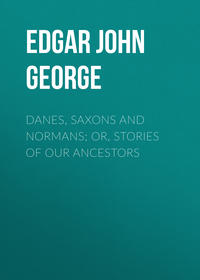Kitap dosya olarak indirilemez ancak uygulamamız üzerinden veya online olarak web sitemizden okunabilir.
Kitabı oku: «Danes, Saxons and Normans; or, Stories of our ancestors», sayfa 19
LV.
AFTER TINCHEBRAY
When Curthose was defeated at Tinchebray and carried captive to the castle of Cardiff, the son whom he had been left by Sybil of Conversano was a little boy, known as William Clito. Not relishing the spectacle of so ambitious a prince as Henry Beauclerc figuring at once as King of England and Duke of Normandy, Louis, King of France – he who, in his earlier years, had quarrelled with the Conqueror's sons over their game of chess at Conflans – supported the pretensions of the son of Robert, and formed a league, with the object of putting him in possession of the duchy which Rolfganger had wrested from Charles the Simple. This, however, proved a much more difficult matter than Louis had anticipated. In fact, Beauclerc exerted himself with such effect that all efforts to diminish his power proved vain; and when, in 1132, William Clito, who had been invested with the earldom of Flanders, died of a wound received while besieging Alost, Louis gave up the struggle in despair.
Meanwhile, Beauclerc had not improved his reputation in the country where he reigned as king. He had been faithless at once to the Saxon people who had placed him on the throne, and to the Saxon princess who, for the sake of her race, had, somewhat against her inclination, united her fate with his. Every promise made to the English had been so unscrupulously violated, that they began to speak of royalty as synonymous with crime; and Maude died with the melancholy reflection that she had sacrificed herself for her race in vain.
Ere "the good queen" was laid at rest in the cathedral of Winchester, she made Henry father of two children – a son, William Atheling, who married a daughter of the Count of Anjou, and a daughter, Matilda, wife of Henry, Emperor of Germany. The son, however, was drowned while on his voyage from Normandy in a vessel called The White Ship; and the daughter, on the death of her imperial husband, returned to England a young and beautiful widow.
About that time, Fulke, Count of Anjou, bowed down with grief at the loss of his wife, undertook a pilgrimage to Jerusalem to seek consolation at the Holy Sepulchre. Before going, Fulke gave Anjou to his eldest son, Geoffrey, who, from wearing a sprig of flowering broom in his hat instead of a feather, was surnamed Plantagenet. Being an accomplished and handsome prince, Geoffrey Plantagenet had the good fortune to secure the friendship of Henry Beauclerc and the hand of the Empress Matilda, who was expected to succeed, on her father's death, to the crown of England and the coronal of Normandy.
It was, however, otherwise ordered. When, in 1135, Henry Beauclerc, having eaten lampreys to excess – such is the story – breathed his last in Normandy, his martial nephew, Stephen of Bouillon, claimed the English crown, and seated himself on the throne. But Matilda was not the woman to submit tamely to exclusion under such circumstances; and a war of succession between her and Stephen was the consequence. A long and sanguinary struggle resulted, and continued, with varying success, till 1153, when it was agreed, by the treaty of Wallingford, that Stephen should be allowed to reign during his life, on condition of recognising young Henry Plantagenet, the son of Geoffrey and Matilda, as his heir. Next year, on the death of Stephen, Henry, who, by his marriage with Eleanor of Aquitaine, had extended his continental dominions from the Channel to the Pyrenees, was crowned King of England in the cathedral of Winchester. From the first he seems to have been in high favour with the nation. In fact, the people, remembering that he derived his descent, through his grandmother, "the good queen Maude," from the ancient monarchs of England, called him "the Saxon king," described him as the natural foe of the Norman nobles, and believed him favourable to such a system of laws as popular tradition ascribed to Edward the Confessor.
But the day for the rise of the vanquished race had not yet come. Nor was it, indeed, till more than a century later, when Simon de Montfort had fallen at Evesham, and the third Henry had gone to his grave, that the monarchy of the Plantagenets, having passed through that terrible struggle celebrated as the Barons' War, was enabled to emancipate itself, in some measure, from the trammels of feudalism, and associate its fortunes with the nation. It was then that the first Edward, already famous as the conqueror of Evesham, returned from romantic adventures and hair-breadth escapes in the East to rule England with justice and righteousness – to give prosperity to the country and protection to the people – to win, by his admirable laws, the title of the English Justinian; and, by his profound and patriotic policy, to unite hostile races into a nation capable of great achievements in war and peace.
